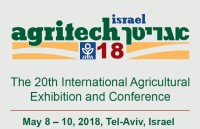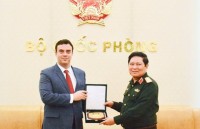
Israel - Vietnam: Two complementary, non-competitive economies
Latest
| TIN LIÊN QUAN | |
| Israel & Vietnam Folk Harmony program | |
| Israel treasures ties with Vietnam: Israeli President | |
 |
| Israel’s Ambassador to Vietnam Nadav Eshcar at an exhibition on agricultural technology in Ha Noi. (Source: Israel Embassy to Vietnam) |
Looking toward an FTA
Ambassador Nadav Eshcar said that Israel is a market with great potentials for Vietnam. Currently, Israel imports nearly 1 billion USD per year from Vietnam with major commodities such as technologies, garments, footwear, and agricultural products like coffee, fish, seafood, spices, and rice. Vietnam is one of Israel’s most important seafood suppliers.
In particular, according to the Ambassador, the two sides are negotiating a free trade agreement (FTA) and have taken many important steps forward. Hopefully, this FTA will be completed in early 2020. At that time, Israeli market will be more open to Vietnamese enterprises. FTA will be very meaningful for Vietnam’s agricultural products because many Israel products are not yet imported from Vietnam, specifically fruits (pomelo, pineapple, and mango). With a completed FTA, those issues will be resolved. According to the experience of the Ambassador, one year after each FTA was signed, trade turnover between the two signed partners will immediately increase by 50%. The Ambassador said that the Israel – Vietnam FTA will not be an exception and this will be the key for the two countries’ trade.
“It can be said that the quality of some Vietnam’s products is very high. Talking about tropical fruits, we also grow mango and pineapple, but in small quantities and lower quality in comparison to Vietnam’s. Therefore, I want my Israel fellows to to enjoy Vietnamese foods as I am enjoying them here”, the Ambassador shared.
On the Israeli side, the Ambassador said that the current focus of the Embassy is to organize trade promotion events with aim to introduce Israel products, mainly in the field of technology, to Vietnam. Technology products are Israel’s main export to Vietnam. According to the Ambassador, when Vietnam’s industries develop to a higher level, export will be facilitated as well. For example, Israel has a very high dairy production technology. Buying this technology, Vietnam can increase milk output of each cow from 15kg/day to 25kg/day. As a result, Vietnamese companies will be more successful, not only in the homeland but also in foreign countries.
Opening investment policies
Regarding Israel’s policy to attract foreign investment, the Ambassador said that Israel has an encouraging investment law, which encourages foreign companies and funds to invest in peripheral areas rather than central areas. For example, Intel Corporation has opened a center in South Israel, right in front of the desert.
“Israel has a high quality workforce like engineers and software developers. This is why many multinational corporations are interested in investing in Israel, even buying Israel’s good companies. Recently, Israel’s MobileEye Company (car safety technology) was bought for about $15 billion. Currently, there are about 300 multinational companies with R&D centers (research and development) in Israel such as Google, IBM, Siemens, Facebook, etc. We are very proud that they have used Israeli human resources in such facilities. Some Vietnamese companies also plan to set up a R&D center in Israel,” said Ambassador Nadav Eshcar.
With Vietnam market, the Ambassador said that Vietnam is a fast-growing economy and also attractive to Israeli investors. Israel has companies operating in almost all fields in Vietnam; some Israeli companies have been doing business in Vietnam for many years. Through many forums, the Israeli Embassy has introduced Israel’s best businesses to Vietnam.
Overall, Israel’s Ambassador emphasized that future prospect of Israeli - Vietnamese cooperation is promising, because the two economies are always complementary and not competing. Israel and Vietnam rarely export the same product to the other. Businesses of both sides are also very interested in each other in spite of distance. Currently, the two governments are trying to establish a direct flight to shorten the travel time from 14-16 hours to 8 hours. As a result, there will be more Israeli businesses and tourists coming to Vietnam and vice versa, further expand investment opportunities.
 | Vietnam attends AgriTech 2018 in Israel Representatives from Vietnamese Ministry of Agriculture and Rural Development and businesses participated in the 20th International Agricultural Exhibition and Conference (Agritech 2018) in Israel on ... |
 | Vietnam-Israel agricultural co-operation to see new breakthroughs On the sidelines of the 20th International Agricultural Exhibition and Conference organised in Israel’s Tel Aviv Convention Centre from May 8-10, 2018, Hoang Van Thang, Deputy ... |
 | Ambassador vows to deepen Vietnam-Israel defence ties Newly-appointed Ambassador of Israel to Vietnam Nadav Eshcar has pledged to do his utmost to promote the cooperation between the two countries, including the elevation ... |













